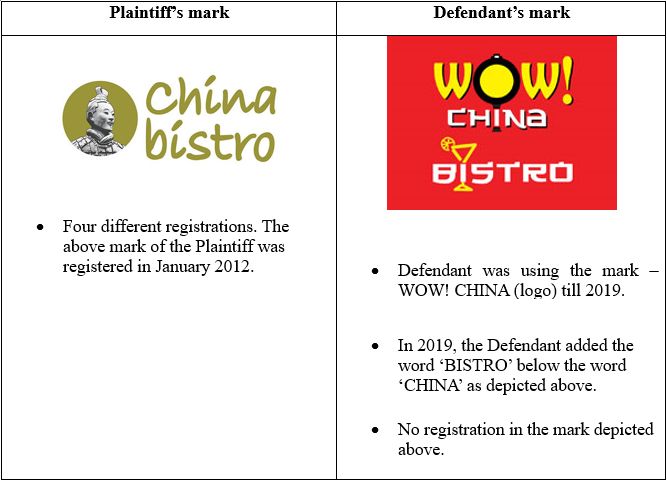In a significant development, the Hon'ble Delhi High Court has recently issued an injunction against the Defendant –Wow Momo Foods Private Limited, holding that the Defendant's mark prima facie infringed the Plaintiff's mark.
Before discussing the dispute underlying the case, it's important to take a glance at the respective marks of both the parties:

The short issue for consideration before the Court was whether the new mark of the Defendant was confusingly or deceptively similar to the Plaintiff's mark The Plaintiff alleged that the Defendant's act of adding "BISTRO" below "CHINA" in its original mark, led to the Defendant's mark becoming deceptively similar to the Plaintiff's mark. It was contended that this addition will create confusion amongst customers of average intelligence and imperfect recollection.
While observing that the rival marks were used for providing similar services, i.e., upmarket restaurants offering Chinese-or Indo Chinese-cuisine, the Court addressed the question of infringement in the following manner:
12. Infringement, unlike passing off, is to be decided on a plain comparison of the rival marks. Goodwill and reputation have little, if any, part to play in the process. The matter has to be examined from the perspective of the customer of average intelligence and imperfect recollection, who is neither a genius, nor a fool. One may, in a sense, liken him to Laxman's immortal "common man" who, even while being observant and discerning, always has that slightly befuddled look on his face. The consumer, moreover, must be one who is not overly familiar with either mark. The classical test is whether such a consumer, endowed with average intelligence and imperfect recollection, who chances on the Plaintiff's mark at one point of time, and on the Defendant's some time later, is given to wonder whether he has seen the mark, or a mark associated with it, earlier. What is required, for infringement to be said to exist, is "initial interest confusion". In other words, if the initial interest generated by seeing the Defendant's mark places the consumer in a "state of wonderment" -to borrow the felicitous expression used by the Division Bench of this Court in Shree Nath Heritage Liquor (P) Ltd v. Allied Blender & Distillers (P) Ltd MANU/DE/1933/2015 : 221 (2015) DLT 359 (DB)-as to whether the mark is the same as the one, he had seen earlier, or bears an association therewith, the tort of infringement stands, ipso facto, committed.
The Court relied on the ratio of the Hon'ble Supreme Court in Kaviraj Pt. Durga Dutt Sharma v. Navratana Pharmaceutical Laboratories (AIR 1965 SC 980) and K.R. Krishna Chettiar v. Shri Ambal & Co. (AIR 1970 SC 146) to conclude that by addition of the word "BISTRO" by the Defendant, a clear case of deceptive similarity has been made out. It was observed that:
17. There can, prima facie, be no doubt that the words CHINA BISTRO, in the case of the Plaintiff's mark, and the words WOW! CHINA BISTRO, in the case of the Defendant's mark, constitute their essential feature.
18. The sequitur, at least prima facie is, to my mind, clear. A customer of average intelligence and imperfect recollection comes, one day, across the Plaintiff's CHINA BISTRO eatery. A few days later, he chances across the Defendant's WOW! CHINA BISTRO outlet. He is not a customer who is aware of the reputation of one mark or the other, for we are dealing, presently, with infringement, not passing off. To my mind, the likelihood of the customer being given to wonder whether the two outlets are not managed by one person, or whether there is no association between the two, is apparent. That, prima facie, satisfies the indicia of infringement, as envisaged by Section 29(2) of the Trade Marks Act.
The Defendant further raised the question of the Plaintiff's entitlement to plead infringement, given that it had disclaimed exclusivity for both the words, i.e., "CHINA" and "BISTRO" in two of its four registrations. It was also contended that the said words are not individually registrable on account of being a geographical area and a publici juris expression for restaurants, respectively. Upon perusal of the Plaintiff's four different registrations over its "CHINA BISTRO" marks, it was observed that not all the registrations contained the aforesaid disclaimer. The dispute here lay in whether the addition of a disclaimer of non-exclusivity over the marks "CHINA" and "BISTRO", as provided in the earlier registration, would also apply to later/associated registrations. The Court, "keeping in mind Section 44 of the Trade Marks Act", answered this in the negative and observed following:
29. My attention has not been invited to any provision by which, by mere association of a later trade mark with an earlier trade mark in the certificate of registration, a disclaimer in the earlier trade mark would ipso facto, apply to the later trade mark as well. Indeed, there is no reason why the certificate of registration of the later marks would not expressly include such disclaimers, if such was the intent of the registering authority.
33. Even if, arguendo, one were to presume that, for all the marks of the Plaintiff, there is a disclaimer of "CHINA" and "BISTRO" individually, the only consequence of such disclaimer, in my opinion, is that the Plaintiff would not be able to urge infringement of a mark of another person solely because the said mark uses the word "CHINA" or the said mark uses the word "BISTRO". However, that would not inhibit the Plaintiff from alleging infringement of the mark of another person on the ground that it is deceptively similar to the composite mark CHINA BISTRO when seen as a whole. Simply put, disclaiming exclusivity in respect of the individual parts of a mark would not ipso facto result in disclaiming exclusivity over the composite mark as a whole.
34. Two ordinary words, though completely lacking in distinctiveness when seen individually may, when combined together, be distinctive. This is, in my considered opinion, prima facie one such case.
Justice Hari Shankar further observed that the words "CHINA" and "BISTRO" constitute the essential feature of both the Plaintiff's and the Defendant's marks. It was held that the mere insertion of disclaimers with respect to the words "CHINA" and "BISTRO" in the registrations granted to the Plaintiff for the composite marks "CHINA BISTRO" would not disentitle the Plaintiff from claiming exclusivity for the composite mark.
Another important remark was on the aspect of distinctiveness. The Defendant here had contended that since the words "CHINA" and "BISTRO" are individually bereft of any distinctive character, it would be for the Plaintiff to show that the composite mark "CHINA BISTRO" is distinctive.
Commenting on this aspect, the Court held that "Even if individual parts of a composite mark are by themselves not distinctive, the composite mark, which combines the individual non-distinctive parts together, may partake of distinctiveness.". As per section 31(1) of the Trademark Act, the Court would presumed validity of the said mark and observed:
42. Where a mark is registered, at a prima facie stage, the plaintiff is entitled to the benefit of Section 31(1)17 of the Trade Marks Act. The court would, therefore, presume, unless it is demonstrated to the contrary by the defendant, that the mark is valid...
43. No material to that effect has been placed on record and no submission to that effect has been advanced by Mr. Sengupta. Even otherwise, plainly seen, I am unable to convince myself that the mark CHINA BISTRO is lacking in distinctiveness. It cannot be said that the mark CHINA BISTRO is an ordinary combination of two words, completely wanting in any element of inventiveness or ingenuity. Even if "BISTRO"" is treated as a synonym for cafeteria or café, it is not an expression which is normally used. It may have been quite different if, for instance, the defendant's mark was CHINESE CAFÉ. The mark would then be plainly descriptive, and lacking in any element of distinctiveness which would distinguish it from any other Chinese eating house. The composite mark CHINA BISTRO, however, in my view, cannot be said to be lacking in distinctiveness, when seen as a whole, in the absence of any evidence or material to that effect led by the defendant.
Author's Take
This case while at the outset seeming simple, is nuanced due to the Defendant's plea of lack of exclusivity and distinctiveness in a composite mark comprised of individually non-distinct / disclaimed parts. The Court has provided rich insights into the interpretation of trademark infringement cases pertaining to disclaimers, associated marks, as well as composite marks.
Case Citation
Foodlink F and B Holdings India Private Limited vs. Wow Momo Foods Private Limited (03.08.2023 – DELHC) (Neutral citation: 2023: DHC: 5521)
To view original article click here
The content of this article is intended to provide a general guide to the subject matter. Specialist advice should be sought about your specific circumstances.


